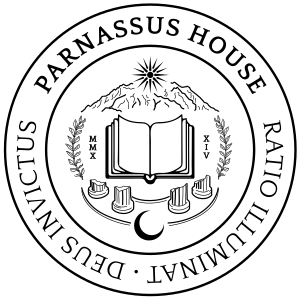Reflections on Plato’s Republic and the importance of education
Parnassus House recently completed its inaugural seminar series on Plato’s Republic. Many thanks to all who participated and dedicated their time to reading and discussing it with us. To mark the occasion, I’d like to offer a brief reflection on what we learned about Plato’s view of the human situation and the importance of education.
We first encounter Socrates walking with Glaucon back to town from a religious festival at the Piraeus. The pair are stopped by Polemarchus and Adeimantus, and although Socrates protests, he and Glaucon are roped into joining the interlopers for an evening of speeches and dinner. Thus we first observe the political community encroaching on the plans and desires of individuals, subordinating them to collective interests. From the very outset of the drama, we are brought to see that the numerical majority has the capacity to create a “regime” which makes claims on individuals that may or may not align with their aims, and which are not easily rebuffed.
In the conversation that follows Socrates raises the theme of justice, which proves sufficiently interesting to replace the evening’s plans. Proceeding from questions first posed to Cephalus, the interlocutors engage the questions: what is justice, and why is it of any concern to a man with money and power? If a man can commit crime with impunity, and in so doing can take many desirable things for himself at the expense of others, would such a life be preferable to a life of moderation and restraint? What, ultimately, is the best way of life—the life that affords the surest path to happiness?
Socrates, in a puzzling maneuver, promises to address the question of justice by “watch[ing] a city coming into being in speech” (369a). He begins by acknowledging that the city comes together, in the first place, because “each of us isn’t self-sufficient but is in need of much” (369b). The impetus for the city is, thus, human vulnerability and need, in the sense of our basic requirements for food, shelter, and clothing. Given the immediacy of such requirements, it follows that humans seek to organize around their optimal fulfillment, with the principle of organization, “one man, one art,” informing mankind’s first conception of the common good (370b). In accord with this principle, we watch the naturally moderate, yet undeniably primitive, city in speech coming into existence. The city needs each individual to dutifully perform a task for the sake of the common good, and in return the individual counts on the city to supply what he needs to live and, perhaps, to thrive.
But Glaucon objects that such a city would be a “city of sows,” unfit to meet the many desires of men such as himself (372d). And so the action of the conversation quickly shifts toward a different concept of political economy, the “feverish city” that is capable of supporting luxurious living, replete with meats, cakes, courtesans, and gold (372e–373a). We come to see that such a city requires growth. And for growth it requires a new art, the art of war, and thus a new class of citizen, the warrior, to form a standing army for the sake of both conquest and defense. This development, though necessary, comes at a cost. The ability to use force to dominate foreign populations is inseparable from the ability to use force to dominate the local population. Once there is a class of heavily armed soldiers capable of such force, despotic political rule by a military faction becomes a threat. Recognizing this problem helps us to see that, although the individual needs the city, and the city needs the individuals to perform their trades and practical arts, it is emphatically not the case that all functional political arrangements afford spontaneous harmony among all inhabitants. As a direct consequence of the development of the city out of what might reasonably be called a “state of nature” and into “civilization” the quest for harmonious living becomes deeply problematic. If the systems we can’t help but build in order to fulfill our needs do not harmonize with all aspects of our lives, then what are the prospects for our achieving happiness? And if our prospects for achieving happiness through fulfilling our needs turn out to be questionable, then what are we to make of broader questions pertaining to the human situation, e.g., that of divine providence?
If Socrates is going to locate perfect justice in the perfect city, then he must address these problems. He does so throughout Books III, IV, and V, demonstrating what would be required of a regime that sought to fully and perfectly harmonize the demands of political life with the lives of each of the human beings that constitute the regime. Education would have to be overhauled by driving out the fractious and tragic character of the gods of Homeric mythology, in favor of a more rational and moderate education. The division of labor, which elevates some individuals to positions of power and authority while subjecting others to necessary but menial tasks, would have to be justified through the widespread belief in a myth—a noble lie—that establishes and legitimates a stable caste system. The possession of private property, which tempts the powerful to gratify their desires through acquisitiveness at the expense of others, would have to be outlawed. The traditional family structure, which causes people to care for their own relatives more than they care for others, would have to be abolished. To that end, the citizens would have to be indoctrinated into believing that they are all one family, and traditional procreative practices would have to be replaced with an elaborate centralized program of eugenic human breeding. Finally, and most laughably according to Socrates, an all-knowing philosopher-king would have to rule over this perfect regime.
The brothers, Glaucon and Adeimantus, become deeply invested in Socrates’ founding of the city in speech over the course of the conversation. They are enamored with its noble perfection, owing to their idealistic hopes, ambitious inclinations, and erotic longings. But the careful reader, aided by common sense as well as some awareness of the complex motives behind Socrates’ questionable moves, understands that the utopia Socrates has constructed is not only untenable—for such an elaborate scheme could never practically work—but it is also undesirable.
The human condition is characterized by inherent tensions that resist resolution. Our souls are filled with erotic longings and thumotic attachments. We want to have more than the natural order seems to provide of its own accord, and somehow feel justified in demanding that the world meet our desires. We seek to become more than the natural order seems to support. To complicate matters, we have capacities for speech and techne. We organize into complex political communities and shape natural materials into surplus goods, which permits us to expand civilization in order to gratify these outsized desires. Such gratification leads not to some ultimate harmony, but rather to expanded desires, disordered appetites, and factionalized conflicts. To attempt to resolve these fundamental problems is to create not a utopia (“no place”) but a dystopia. In the final analysis, man seems destined always to exist in some degree of fundamental tension with his regime.
Still seeking definitive proof that the just life is choiceworthy for its own sake, over and against the tyrannical life, Socrates goes on to classify the parts and types of the human soul. Comparing the types of soul to types of regime, he shows the tendency for decadence to arise as a function of the shift from noble and prescriptive ways of life into base and permissive habits. Humans are creatures of habit. We are not purely rational beings, capable of understanding the causes and effects of our choices and actions at every moment. We depend heavily on routines to shape our behavior. Once we have habituated ourselves to gratifying our desires—for only necessary goods, at first, but then for unnecessary ones, and finally even harmful pleasures—the soul manifests a kind of corruption that makes it difficult or impossible to live well. Desire is, at once, essential to our being, and a spectral plague that threatens the possibility of our flourishing. Or, as Cephalus puts it in Book I, eros is a “mad master” (329c). Thus, Socrates emphasizes the importance of the virtue of moderation. Through moderation, we can tame our desires like a master taming a wild beast, and in so doing we can live as harmoniously as our nature and our politics permits.
But we have come to understand that mankind is not naturally endowed with the virtue of moderation, and so the pressing question becomes: how does one cultivate it? Returning to the beginning, we see that Socrates has been suggesting and demonstrating the answer to that question all along. From the refutations in Book I, through the poetic reforms of Book III, through the allegorical imagery of Books VI and VII, to name only a few examples, Socrates emphasizes the crucial importance of education. Only though good education can man properly structure his soul. Only through good education can he adequately habituate himself to a way of life that affords flourishing, insofar as flourishing is permitted by his circumstances. The best life is only possible with the right kind of education. Insofar as the teaching of the Republic aims to guide careful readers in pursuit of the best way of life, it makes its greatest theme that of the pursuit of a proper education.
A proper education is one that liberates us to lead good lives. We all live in political regimes, due to necessity. Political regimes support the possibility of living nobler and better lives than could be lived without them. But they also burden us with tasks that exhaust us, laws that coerce us, pleasures that tempt us, pains that sting us, and various other dynamics that chafe against our natural longings. The uneducated soul—or, worse, the badly educated soul— will not naturally find its way towards higher and better possibilities because it will be snared and crippled by the tyranny of vice. But through good education we stand a chance of seeking the best of what is possible for us, and avoiding the worst.
We founded Parnassus House to provide such an education—the kind that makes us better learners, better teachers, better leaders, and better friends. There could scarcely be a more important task than to prepare ourselves and our friends for the pursuit of the good life. Studying Plato’s Republic is only the beginning, but it is the best possible beginning we could imagine. We invite you to join us as we continue to learn and to teach in the spirit of care and friendship.

